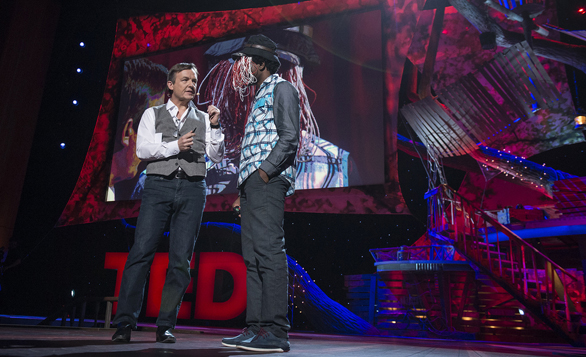
Chris Anderson talks to investigative journalist Anas Aremeyaw Anas at TED2013. Photo: James Duncan Davidson
From Bob Woodward and Charles Bernstein to Upton Sinclair and Nellie Bly, investigative journalists have shaped the course of history by uncovering troubling truths of their times. These watchdogs work to keep governments and companies honest, sometimes putting their own safety at risk. At a time where newspapers face a rocky future, it’s good to be reminded of the power of journalism.
 Anas Aremeyaw Anas: How I named, shamed and jailed
In his talk from TED2013, Anas Aremeyaw Anas shares his experience as an investigative journalist in Ghana, where he has uncovered cases of police bribery, child brutality and government corruption. He’s repeatedly risked his life in the process. In fact, his identity is so secret that his face remained hidden on the TED stage.
Anas Aremeyaw Anas: How I named, shamed and jailed
In his talk from TED2013, Anas Aremeyaw Anas shares his experience as an investigative journalist in Ghana, where he has uncovered cases of police bribery, child brutality and government corruption. He’s repeatedly risked his life in the process. In fact, his identity is so secret that his face remained hidden on the TED stage.
This week’s TED Weekends on the Huffington Post celebrates investigative journalists like Anas. Tales of brave correspondents are mixed with analysis of the merits and dangers of this type of reporting, and thought is given to what people like Edward Snowden and Glenn Greenwald might mean for the equation. Below, excerpts from this weekend’s four essays to pique your interest.
Anas Aremeyaw Anas: Journalism and the Danger in Truth-seeking
In October 2004, I found myself behind the locked gates of the Bang Kwang Central — Thailand’s maximum-security prison. Known in popular culture as the ‘Bangkok Hilton’, the prison houses about 8,000 inmates. Each new inmate mandatorily wears a leg iron for three months.
Inside the jail, I gestured the sign of the cross as I repeated to a line of prisoners: “Through God’s mercy and the ministry of the Church… I absolve you of all your sins… in the name of the Father and of the Son… and of the Holy Spirit”.
Cloaked in a cassock, I was doing what prison chaplains do — offering penitence to convicts. Each of those convicts was either on death row or serving life sentences as drug couriers. Many of them were Ghanaian prisoners who told me about their suffering under the hands of the prison guards. They gave me details of how a colleague died the previous week from fork wounds inflicted by a prison guard. I made my notes for a story, and carefully exited the locked gates when my work was done. Read the full essay »
Robert Miraldi: Seymour Hersh: A Man Still on Fire
In the fall of 1969, as men walked on the moon and Ted Kennedy’s car slipped off a bridge, Sy Hersh, a 32-year-old hard-nosed reporter, was chasing down the biggest tip of his life. The Army was detaining a soldier, somewhere, for allegedly killing a large number of Vietnamese civilians. He understood that such a massacre spoke directly to what the war in Southeast Asia had become: American boys killing old men and women and children.
Seymour Myron Hersh needed little convincing that the war was bad — and little training in how to track it down. In his cub reporting days at the City News Bureau in Chicago he had learned to do whatever he had to get information in the rough-and-tumble of the Windy City. Then, at the Associated Press for four years, he learned to cuddle up to all sorts of sources, from a triumphant Martin Luther King Jr. to reluctant generals who confirmed illegal bombings in Vietnam. Read the full essay »
Magda Abu-Fadil: On a Mission to Uproot Corruption
Gutsy, focused, determined, foolhardy, dangerous, and unethical could be apt descriptions of Anas Aremeyaw Anas, who has spent 14 years as an undercover reporter shedding light on issues that are common in developing countries, including in the Middle East/North Africa region.
Investigative journalism is a complex undertaking requiring courage, perseverance, proper planning and full appreciation of the dangers it represents. Corruption in any country invariably involves collusion by some form of authority or other, thereby enabling wrongdoers to get away with it. There are ample examples.
When corrupt government officials and/or citizens are uncovered, it often requires gargantuan efforts to ensure they get their comeuppance. Anas demonstrated in his TEDTalk he is on a mission to uproot corruption. The question then arises: Is he a journalist, an activist, or a vigilante? Read the full essay »
Jonathan Weiler: Glenn Greenwald and the Value of Journalism
Anas Aremeyaw Anas’ extraordinary courage and resourcefulness are worthy of our highest praise and admiration. At great personal risk, he has shone a spotlight on official and private corruption and malfeasance in Ghana. In so doing, he has served a vital public good by striking a blow for accountability against otherwise unaccountable leaders.
While the context within which journalism takes place is vastly different in Ghana than in the United States, Anas’ extraordinary work has me thinking about a debate in America that has acquired new meaning since Glenn Greenwald and others first started reporting in June on the NSA documents leaked by Edward Snowden. From the very beginning of that ongoing story, an important question has come up over and over again: Is “advocacy” journalism really journalism? In its ugliest forms, this has manifested itself in suggestions from among his own putative professional fraternity that Greenwald be arrested, including from the New York Times‘ Andrew Ross Sorkin (who later apologized), and Meet the Press‘s David Gregory.
Of course, the question raised here goes well beyond Greenwald. Read the full essay »
Comments (3)